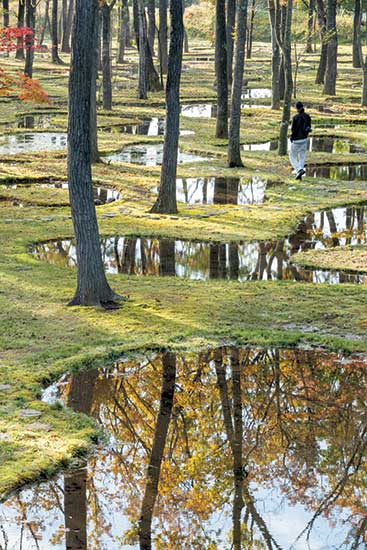Water Garden by Junya Ishigami
Tochigi Prefecture, Japan

Water Garden by Junya Ishigami
Photo © Iwan Baan

Water Garden by Junya Ishigami
Photo © Iwan Baan


Architects & Firms
A once-open meadow in Japan’s Tochigi Prefecture is now a forest of seemingly countless trees and a maze of ponds. Designed by architect Junya Ishigami, this “water garden” is an addition to Art Biotope, an artists residence and hotel nestled in the town of Nasu, known for sightseeing, hot springs, and ski resorts.
The water garden’s design is a product of circumstance: when it was determined that hundreds of trees in a nearby site should be felled to make room for a new hotel, Ishigami proposed replanting them in the adjacent meadow. The resulting landscape, a place of reflection and meditation for Art Biotope residents, has the uncanny and almost fantastical quality that characterizes some of Ishigami’s conceptual work such as the House of Peace, a cloud-shaped building that floats in the ocean, where the water’s surface serves as the floor, or the design for Kids Park, in which a playground is built in the way that a city is planned, populated by large animals instead of buildings.

The garden teeters between the natural and man-made: the architect positioned the trees in precise locations for a controlled randomness that can appear infinite. Hundreds of amorphously shaped ponds—distinct, yet all connected to an existing irrigation system that maintains water levels—snake between the trees, forming meandering passages between them, traced by simple stone paths.
According to Ishigami, the water garden takes into consideration the history of the site, which had previously transitioned from a mossy forest to a paddy field to a meadow before being transformed into its current dreamlike state; the trees and the ponds are like overlapping layers of the past. The outcome, writes the architect, is “a new nature never before seen.”









